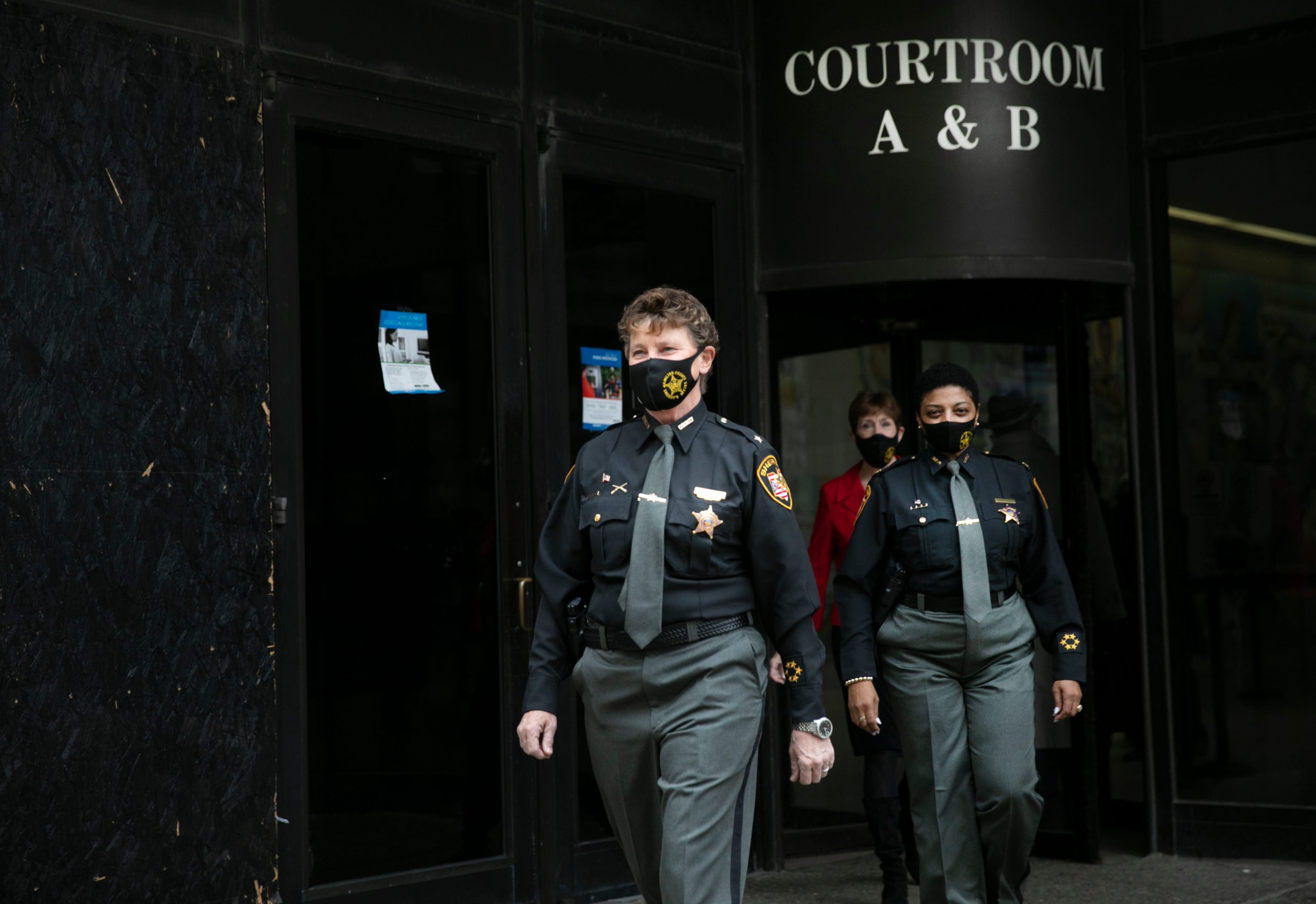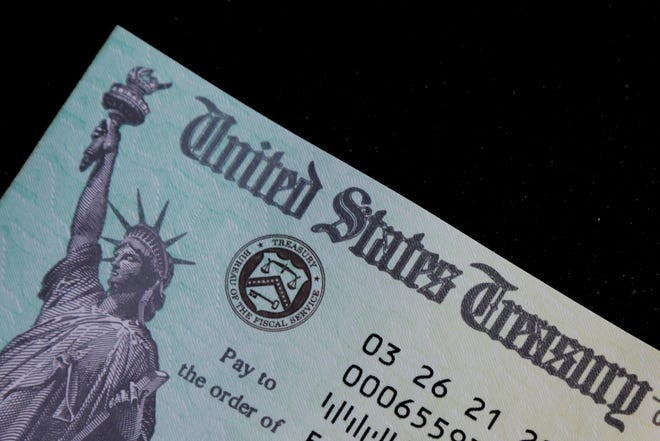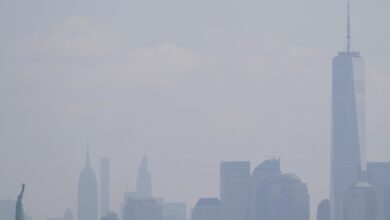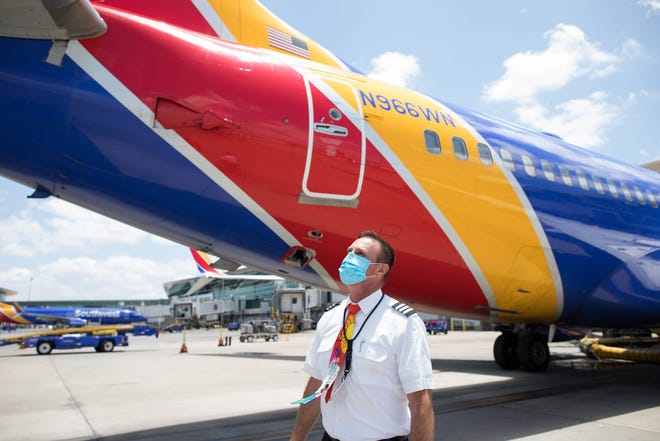MINNEAPOLIS — Jury selection was delayed Monday in the trial of former Minneapolis police officer Derek Chauvin while an appeal proceeds over the possible reinstatement of a third-degree murder charge.
Chauvin is charged with second-degree murder and manslaughter in the death of George Floyd last May. Prosecutors contend Floyd, 46, was killed by Chauvin's knee, compressed against Floyd’s neck for more than 9 minutes while he was handcuffed and pinned to the pavement.
Legal experts say bystander video of the incident, as well as two autopsy reports, will play central roles in the trial. The question at the heart of the case is whether what people saw on the video was murder or a terrible tragedy.
Jury selection was delayed until at least Tuesday. Twelve jurors and up to four alternates will be selected in a process that could take up to three weeks. Opening arguments are scheduled for March 29.
Latest updates:
- Court began with a brief back-and-forth regarding a third-degree murder charge against Chauvin that had been dismissed. Hennepin County District Judge Peter Cahill ruled Monday that the court would go forward with jury selection while the appeal is pending, but after a brief recess, the judge cut the jurors loose.
- Derek Chauvin appeared in court Monday. Bridgett Floyd, George Floyd's sister and founder of the George Floyd Memorial Foundation, was the Floyd family representative in court and was sitting in back.
- Leading up to the trial, there have been a handful of peaceful protests, with a demonstration Monday morning at the courthouse and a vigil planned Monday night at George Floyd Square.
The USA TODAY Network will be bringing you live coverage of the Derek Chauvin trial. Refresh this page updates. Follow our team of reporters on Twitter here. For news delivered to your inbox, sign up for the Daily Briefing newsletter.
Judge sends jurors home for the day
Hennepin County District Judge Peter Cahill initially ruled that jury selection would begin as scheduled on Monday. But prosecutors then said they would ask the Court of Appeals to intervene, which could put the case on hold. So Cahill sent the potential jurors home for the day.
Cahill said jury selection would be delayed until at least Tuesday.
“I did indicate it was my intent that we’d go forward with motions to eliminate and jury selection, unless someone tells me not to,” Cahill said after the brief recess. “I think realistically we’re not going to get to any jury selection or we won’t have an answer until at least tomorrow."
Chauvin is charged with second-degree murder and manslaughter in Floyd’s death. Legal experts say reinstating the third-degree murder charge would improve the odds of getting a conviction. Chauvin’s attorney, Eric Nelson, said Monday he would ask the state Supreme Court to review a Court of Appeals decision that ordered Cahill to reconsider the charge.

Courtroom revamped for social distancing
The courtroom on the 18th floor of the courthouse has been revamped to allow for social distancing. Big clear plastic dividers separate Hennepin County District Judge Peter Cahill and court staffers from the limited number of other people in the courtroom. Clear plastic dividers also run down the middle of the defense and prosecution tables.
Two sheriff’s deputies are providing security inside the courtroom. Other deputies and county security personnel are stationed elsewhere on the 18th floor. At least a few Minnesota National Guard members wearing the insignia of the Red Bulls are on the ground floor.
Chauvin stood at military-like attention as Judge Cahill entered and called court to order, not facing the judge because his seat points off to the side toward the jury box. He wore a black mask and a blue suit.
Downtown Minneapolis: 'We’re going to be out here until they remember'
Several businesses in downtown Minneapolis were boarded up Monday near the Hennepin County Government Center, which is surrounded by barbed wire, fencing and concrete barriers. Activists and artists were gathering in front of the courthouse, trying to process the anger that has been simmering in the city since Floyd’s death last May.
Leesa Kelly, founder of Memorialize the Movement, said she came to the courthouse to urge the city, the Minneapolis Police Department and Chauvin to reflect on the damage done to the community. "We’re going to be out here until they remember, until we see justice," Kelly said. "It was heartbreaking, it was emotionally exhausting and draining. As a Black woman I felt broken."
Kelly’s organization has collected more than 750 plywood art murals created during the protests, many of which they displayed in front of the courthouse Monday. Kelly, operations manager at the Minnesota African American Heritage Museum, said the murals are a "symbol of our collective grief."
Athena Papagiannopoulos remembers feeling "shattered" when officer Jeronimo Yanez was acquitted after the fatal shooting of Philando Castile in 2016. She has been organizing protests since then, but said she feels like nothing has changed in Minneapolis. Papagiannopoulos said her organization is working with the Floyd family to plan more actions as the trial continues.
"I’m so angry, I’m so sad, it’s just so overwhelming," said Papagiannopoulos, founder of Visual Black Justice. "The city will just burn again just like last summer if something isn’t done."
Demonstration, vigil planned Monday
More than a dozen activist groups, including Black Lives Matter Minnesota and Communities United Against Police Brutality, plan a demonstration outside the courthouse Monday, starting at 8:30 a.m. CST, KARE 11 reported.
The George Floyd Global Memorial will hold a gathering with faith leaders at George Floyd Square at 8 a.m. CST, ending in a candlelight vigil at 6 p.m., some of which will be livestreamed, according to the group's website. The square is at the intersection of East 38th Street and Chicago Avenue where Floyd died.
On Saturday, dozens of people gathered in front of the Minnesota governor’s mansion in St. Paul to demand accountability for police officers. Many of the roughly 150 people who demonstrated were family members of others who died during police encounters. Similar protests were being organized in cities around the country in advance of the trial of Derek Chauvin.
Minneapolis increases security

Last month, city officials began solidifying security plans and establishing a security perimeter around City Hall, nearby buildings and the courthouse where jury selection will begin Monday. Streets will be closed, businesses will be boarded up and National Guard troops and hundreds of law enforcement officers will be in place in anticipation of potential unrest during the trial, set to begin March 29.
Last year, following Floyd's death, rioting and looting broke out across the city over three nights, and hundreds of buildings were damaged, including some that were set on fire. Protests quickly spread beyond Minneapolis to Saint Paul, then across the nation of world. The large majority of protests throughout the summer were peaceful.
Last week, the U.S. House of Representatives passed a police reform bill named after Floyd, which would ban chokeholds and neck restraints at a federal level, among other major reforms.
Contributing: Associated Press









